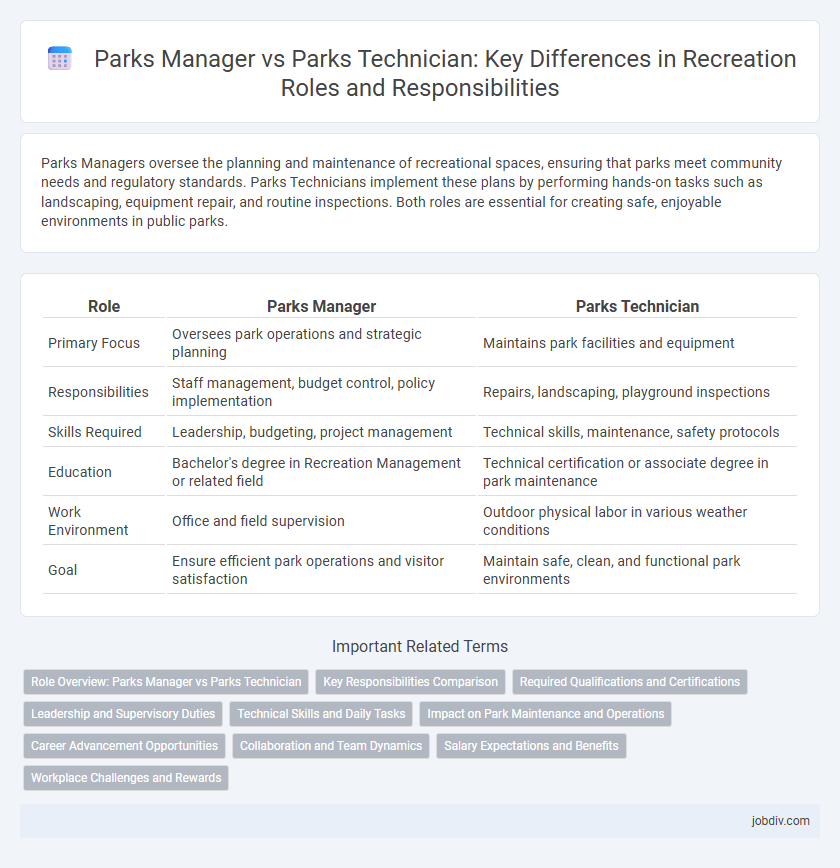Parks Managers oversee the planning and maintenance of recreational spaces, ensuring that parks meet community needs and regulatory standards. Parks Technicians implement these plans by performing hands-on tasks such as landscaping, equipment repair, and routine inspections. Both roles are essential for creating safe, enjoyable environments in public parks.
Table of Comparison
| Role | Parks Manager | Parks Technician |
|---|---|---|
| Primary Focus | Oversees park operations and strategic planning | Maintains park facilities and equipment |
| Responsibilities | Staff management, budget control, policy implementation | Repairs, landscaping, playground inspections |
| Skills Required | Leadership, budgeting, project management | Technical skills, maintenance, safety protocols |
| Education | Bachelor's degree in Recreation Management or related field | Technical certification or associate degree in park maintenance |
| Work Environment | Office and field supervision | Outdoor physical labor in various weather conditions |
| Goal | Ensure efficient park operations and visitor satisfaction | Maintain safe, clean, and functional park environments |
Role Overview: Parks Manager vs Parks Technician
A Parks Manager oversees the strategic planning, maintenance, and operations of recreational parks, focusing on resource allocation, staff supervision, and community engagement to ensure park services meet public needs. In contrast, a Parks Technician performs hands-on tasks such as equipment maintenance, landscaping, and facility repairs, directly supporting the physical upkeep and safety of park environments. The Parks Manager typically holds a leadership role with decision-making responsibilities, while the Parks Technician provides essential technical support within park management teams.
Key Responsibilities Comparison
Parks Managers oversee strategic planning, budgeting, and staff supervision to ensure efficient park operations and community engagement. Parks Technicians focus on hands-on maintenance, equipment repair, and implementing safety protocols to preserve park facilities and natural resources. Both roles are essential for maintaining park quality but differ in scope, with managers handling administrative tasks and technicians executing daily operational duties.
Required Qualifications and Certifications
A Parks Manager typically requires a bachelor's degree in park management, environmental science, or public administration, along with certifications such as the Certified Park and Recreation Professional (CPRP) credential. Parks Technicians usually need a high school diploma or equivalent, with additional technical training or certifications related to landscaping, equipment operation, or safety standards like OSHA. Both roles prioritize knowledge of local environmental regulations and recreational facility maintenance, but managerial positions emphasize leadership and project management skills.
Leadership and Supervisory Duties
Parks Managers oversee the strategic planning and leadership of park operations, focusing on resource allocation, team supervision, and community engagement to ensure efficient park management. Parks Technicians carry out hands-on maintenance tasks under the direction of managers, supporting operational goals through technical expertise and adherence to safety standards. The Parks Manager typically holds supervisory responsibilities, including staff training, performance evaluation, and coordination of park improvement projects.
Technical Skills and Daily Tasks
Parks Managers oversee park operations, including staff coordination, budget management, and strategic planning, requiring strong leadership and organizational skills. Parks Technicians perform hands-on maintenance, such as repairing equipment, landscaping, and trail upkeep, demanding technical proficiency in machinery operation and groundskeeping. Both roles require knowledge of environmental regulations and safety protocols to ensure well-maintained and safe public recreational spaces.
Impact on Park Maintenance and Operations
A Parks Manager coordinates park maintenance schedules, resource allocation, and oversees operational compliance, ensuring efficient and sustainable park management. Parks Technicians execute hands-on maintenance tasks such as landscaping, equipment repair, and facility upkeep, directly impacting park aesthetics and safety. The collaboration between managers' strategic planning and technicians' technical skills significantly enhances overall park functionality and visitor experience.
Career Advancement Opportunities
Parks Managers oversee strategic planning, budget management, and staff supervision, positioning themselves for leadership roles such as Regional Park Director or Recreation Program Coordinator. Parks Technicians focus on hands-on maintenance, equipment operation, and facility repairs, often advancing to senior technician roles or transitioning into supervisory positions with additional training. Career progression for Parks Managers typically involves higher education and administrative expertise, whereas Parks Technicians advance through experience and specialized certifications in park operations.
Collaboration and Team Dynamics
Parks Managers coordinate strategic planning and resource allocation while collaborating closely with Parks Technicians who execute maintenance and operational tasks directly in the field. Effective team dynamics hinge on clear communication channels, role clarity, and mutual respect between management and technical staff to optimize park facilities and visitor experience. Regular interdisciplinary meetings and shared goal-setting enhance collaboration, fostering a cohesive and efficient parks management team.
Salary Expectations and Benefits
Parks Managers typically earn higher salaries than Parks Technicians, reflecting their greater responsibilities in overseeing park operations, budgeting, and staff management, with average annual salaries ranging from $55,000 to $80,000. Parks Technicians, responsible for maintenance and technical support, usually earn between $35,000 and $50,000 annually, often complemented by benefits such as health insurance, retirement plans, and paid leave. Both roles may include additional perks like access to recreational facilities and professional development opportunities, but compensation packages vary significantly based on geographic location and agency size.
Workplace Challenges and Rewards
Parks Managers face workplace challenges including budget constraints, staff coordination, and ensuring compliance with environmental regulations while overseeing park maintenance and development. Parks Technicians encounter physical demands, equipment upkeep, and direct interaction with park visitors, which require technical skills and adaptability. Both roles offer rewards such as contributing to community well-being, preserving natural spaces, and supporting outdoor recreational opportunities.
Parks Manager vs Parks Technician Infographic

 jobdiv.com
jobdiv.com